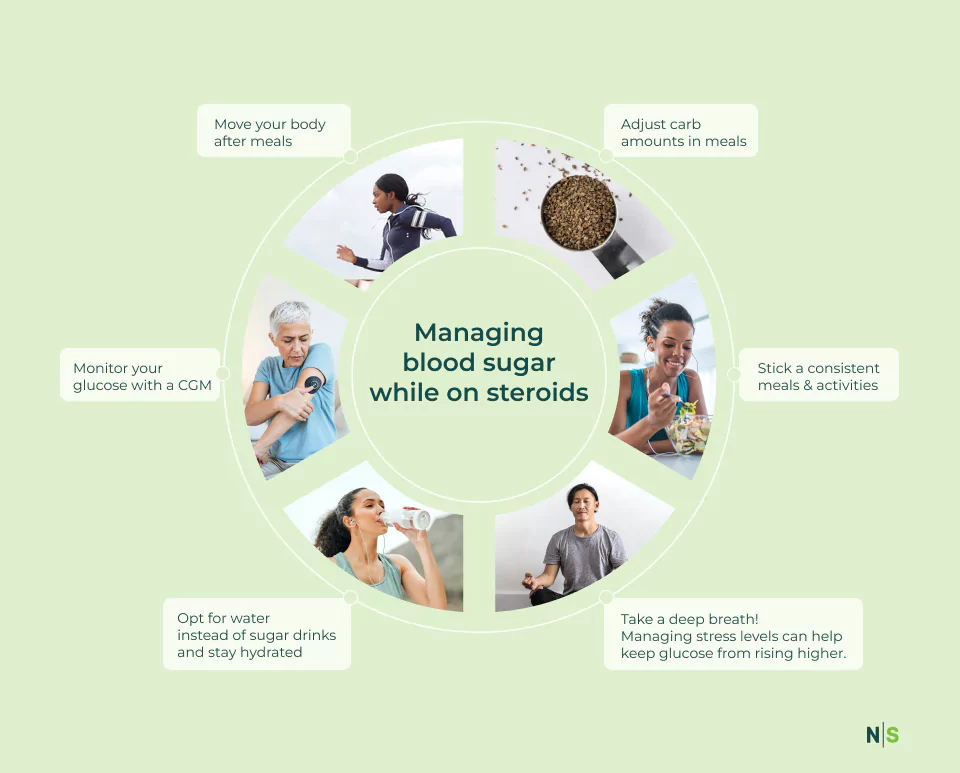Understanding the Effects: How Steroids Impact Your Blood Sugar
.webp)
Key Takeaways
Steroids are often associated with bodybuilders and other athletes trying to increase muscle mass and improve performance. But many different types of steroids serve essential functions to help treat inflammation in the body.
Doctors may prescribe steroids to treat anything from a skin condition to rheumatoid arthritis. But how do these medications work exactly? And do they have any effect on blood sugar levels?
Let’s explore the potential effects steroids can have on the body and how you can stay on top of any adverse side effects that they may cause.
What Are Steroids?
Steroids are a class of lipids that include all the sex hormones (estrogen, progesterone, testosterone), and adrenal cortical hormones such as cortisol, aldosterone, and DHEA. Other types of steroids are made up of bile acids and sterols (like cholesterol), as well as many other sterol-based substances found in animals and plants.In the body, sterol is an essential part of the cell membranes. Below we'll talk about two categories of steroids: corticosteroids and anabolic steroids. Each of these categories has different uses and can be ingested in various forms depending on their use.
Corticosteroids

Corticosteroids are broken down into two further categories: glucocorticoids and mineralocorticoids. In this article, we’ll be focusing on the glucocorticoid category of steroid treatment.
Doctors commonly prescribe glucocorticoids like corticosterone and cortisol to treat conditions caused by inflammation. These hormones have been in use since the 1940s, initially as a treatment for rheumatoid arthritis.
This type of therapy works by suppressing inflammatory genes that cause conditions linked to inflammation. They are typically used as short-term treatment options to improve inflammatory symptoms.If you have a condition such as eczema, arthritis, lupus, multiple sclerosis, allergies, or asthma, your doctor may prescribe you corticosteroids. They are available as a pill, cream, inhaler, eyedrop, injection, or nasal spray.
While these steroids may successfully treat symptoms of these conditions, they can have many side effects. Short-term use can lead to acne, nausea, blood sugar spikes, and trouble sleeping. Long-term steroid treatment can cause serious health conditions like chronic inflammatory diseases and other Rheumatic diseases.
Anabolic Steroids
Anabolic-androgenic steroids, on the other hand, which can commonly include a type of synthetic testosterone. These steroids were first used in the 1930s as a treatment for depression and later became popular among athletes.
These steroids are usually prescribed to people to treat hormonal issues, anemia, or muscle loss in individuals with severe health conditions. However, this steroid is more commonly known for its use as a performance enhancer in athletes and can facilitate muscle gain and strength.
You'd usually take anabolic steroids through an injection into the muscle, but they are also available in the form of creams and pills. When misused, anabolic steroids can lead to severe long-term side effects.In men, side effects such as reduced sperm count and infertility are often observed. Women who use anabolic steroids may experience facial hair growth and loss of menstruation in women. These steroids are also linked to increased acne, aggression, intense mood swings, and other cognitive abnormalities.
Do Steroids Affect Blood Sugar Levels?

While both types of steroids can serve an important function in treating conditions caused by inflammation, these hormones don’t come without side effects. The effects of steroid treatments can vary depending on how long you take them for, but one of the most notable is a rise in blood sugar levels.
Studies show that steroid-induced diabetes is a common occurrence among individuals treated for various health conditions using corticosteroids. Steroids may increase your blood sugar levels by causing beta cell dysfunction and reducing insulin sensitivity.
One study found that anabolic steroid abuse has links with impaired insulin sensitivity. In another study on hospitalized patients, researchers found that over half the patients who were treated with high doses of corticosteroids developed hyperglycemia. Research noted this risk was higher for individuals already at risk for developing diabetes.
For some people, steroid-induced diabetes can subside after you stop using the medication. However, other people, especially those who were already at risk for developing type 2 diabetes, may continue to suffer from it. Researchers predict that this side effect will become more widespread as steroid use is expanded to treat a larger range of conditions. Due to this risk, in addition to other potential side effects when undergoing a steroid treatment, monitoring your blood sugar is important.
Helpful Tips for Blood Sugar Management While on Steroids
If you are prescribed steroids to treat a health condition, understanding the risks of hyperglycemia and steroid-induced diabetes is important. Here are some tips to regulate your blood sugar levels while using steroid medication.

Check Glucose Levels More Often with a CGM

Monitoring how your blood sugar fluctuates in response to dietary and lifestyle factors to understand the effect steroids may be having on your glucose levels. A continuous glucose monitor (CGM) from the Nutrisense CGM program allows you to monitor your levels in real-time.
A CGM can help you determine if your postprandial glucose response is normal. This is especially beneficial for anyone using steroids since research has indicated that steroid-induced diabetes is usually detected in the postprandial state (or a few hours after eating).
Move your Body After Meals
Walking or engaging in some form of movement after eating is proven to help regulate blood sugar. This is especially true when it comes to postprandial glucose levels.
Low impact exercises like walking or hiking have also been found to be beneficial for your overall metabolic health. Getting extra steps in after eating may also help with weight loss and high blood pressure.
Eat at Regular Times & Don’t Skip Meals
Irregular eating patterns have been observed in some studies to lead to abnormal glucose responses. You may also experience adverse health effects such as brain fog and drowsiness when skipping meals.
One study found that in the case of weight loss, individuals who regularly ate late lunches lost less weight and had poorer glucose responses than those who ate lunch before 2 p.m. In another study, skipping breakfast was observed to increase average blood sugar levels over a period of 24 hours in participants.
Eating times and their effect on glycemic control may vary depending on the person. If you’re unsure of what dietary pattern is right for you, you may want to consult a doctor or dietitian.
Monitor Your Food, Drink, and Physical Activity
When it comes to diet and exercise, there’s no one-size-fits-all solution to optimize your blood sugar levels. However, determining what dietary factors may be leading to unfavorable blood sugar spikes for you can be helpful in preventing them.
Taking steps to eat a healthy, balanced diet while undergoing a steroid treatment can also help you reduce the risk of steroid-induced hyperglycemia. Exercise is also critical to ensuring optimal metabolic health.
Getting plenty of regular physical activity can help regulate your glucose. Consult with a dietitian or nutritionist to create an eating and exercise plan based on your individual health needs.
Watch your Carbohydrate Intake
Taking steps to monitor your carbohydrate intake can help you regulate your blood sugar levels. Here are some tips that can help keep you on track.
1) Drink Water Instead of Sports Drinks or Sodas

There are lots of health benefits to staying adequately hydrated. Drinking lots of water can promote healthy skin, good kidney health, and even boost your cognitive function.
Research has found that consumption of these sorts of drinks, which are typically high in sugar and low in nutrients, is linked to a higher risk of type 2 diabetes. Opting for water rather than sugary drinks like sports drinks, soda, and fruit juice can help you avoid sharp blood sugar spikes and keep you hydrated.
2) Choose Fresh Fruits Over Sugary Desserts
Everyone has a sweet craving from time to time, and that’s why it’s important to understand the difference between natural and added sugars. Increased sugar consumption can increase your risk of obesity, cardiovascular disease, and other health conditions.
Natural sugars found in fruits should be included in a healthy, balanced diet and are full of vitamins and minerals. Fresh fruits like apples, raspberries, and strawberries are all good sources of fiber, which support healthy glucose responses, although these foods naturally contain sugar.
3) Maintain a Healthy Diet With Low Sugar Intake

The American Heart Association recommends limiting your added sugar consumption to no more than six percent of your daily calorie intake. This is about six teaspoons of sugar per day for women and nine teaspoons for men.
Limiting your sugar intake may be even more important for people undergoing steroid treatment, since they may be prone to poor glycemic control. Instead of opting for sugary foods, increase your protein intake to help keep you satiated.
Find the right Nutrisense programto turn insight into progress.
Go Beyond Glucose Data with Nutrisense
Your glucose can significantly impact how your body feels and functions. That’s why stable levels are an important factor in supporting overall wellbeing. But viewing glucose isn't enough. Nutrisense, you’ll be able to learn how to use your body's data to make informed lifestyle choices that support healthy living.
One-to-one coaching
Sign up to access insurance-covered video calls to work with a glucose expert: a personal registered dietitian or certified nutritionist who will help tailor your lifestyle and diet to your goals.
Monitor and measure what matters
With the Nutrisense CGM Program, you can monitor your glucose with health tech like glucose biosensors and continuous glucose monitor (CGM)s, and analyze the trends over time with the Nutrisense App. This will help you make the most informed choices about the foods you consume and their impact on your health.
Find your best fit
Ready to take the first step? Start with our quiz to find the right Nutrisense program to help you take control.

Heather is a Registered and Licensed Dietitian Nutritionist (RDN, LDN), subject matter expert, and technical writer, with a master's degree in nutrition science from Bastyr University. She has a specialty in neuroendocrinology and has been working in the field of nutrition—including nutrition research, education, medical writing, and clinical integrative and functional nutrition—for over 15 years.


.webp)

